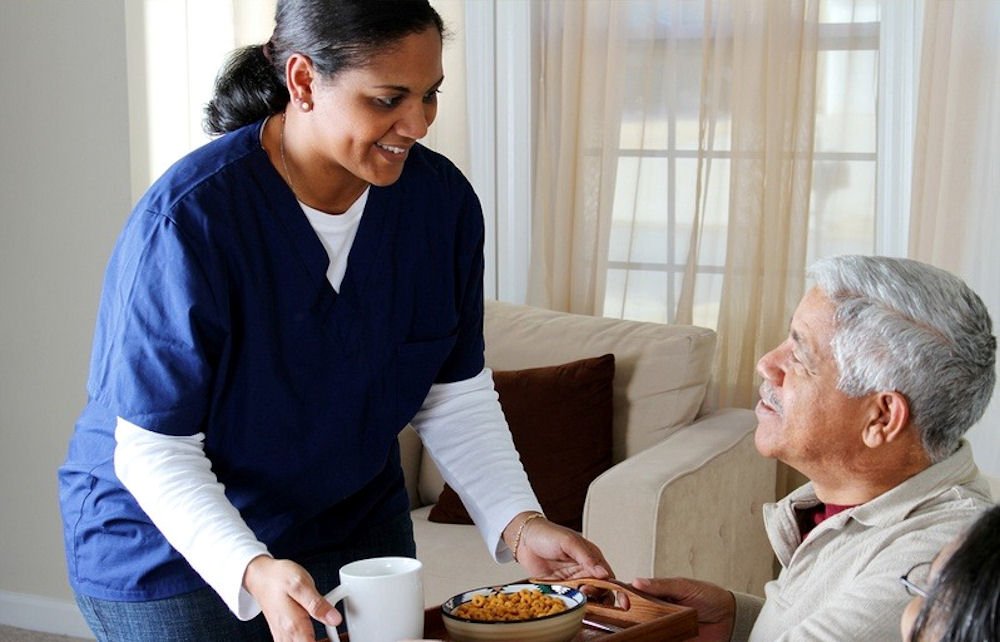Nutrition is a major consideration for people of any age group, but it is of the utmost importance, particularly during the developmental years and the elderly years. During the developmental years, the growth that characterizes the period needs the energy provided by nutrition to sustain it.
When a person reaches the senior years, however, physical therapy and nutrition become important in maintaining the energy to prevent the onset of disease and weakness, as the elderly tend to be less active and not engage in regular exercise anymore. As people get older, nutrition and aging become important considerations for sustaining proper biological function.
At Shepherd Premier Senior Living in Crystal Lake, Illinois, we believe that nutrition and aging go hand-in-hand. Our Illinois communities promote healthy senior living. We take care of our resident’s minds and bodies to help them maintain a high quality of life.
Why is Nutrition Important for the Elderly?
As people get older, certain bodily functions become less efficient, particularly when it comes to strength, immunity, and recuperation. This is why seniors require food items that are higher in specific nutrients and easier to process so that the body receives the required boost it needs. Diabetes is a common condition among those of advanced age. This is because many elderly people begin to experience increased insulin resistance and impaired pancreatic islet function. These two factors combined increase the chances of the elderly developing type 2 diabetes. This is particularly dangerous for people of advanced age because if their blood sugar levels get too high or fall too low, there is always the imminent threat of injury. People have been known to just keel over and blackout when their blood sugar dips too low, and for elderly people, this could result in a concussion, fractures, or worse.
This is why it is imperative to consider the sugar content of the food items included in the diet of an elderly person. In some cases, even the natural sugars found in fruit could be hazardous. Depending on the severity of the condition and the prevailing blood sugar levels, doctors will typically advise moderation or even staying away completely from foods known to have sugar. Weight management is an important consideration for people of all ages, as obesity is a very real threat to many Americans. It is important to maintain total body weight within a specific range deemed to be normal considering the person’s age, build, and overall condition because an elevated body mass index could increase an elderly person’s chances of developing serious health issues, including cardiovascular disease, hypertension, and diabetes.
It is common knowledge that many elderly people begin to have increasing difficulty in moving about as they get older, and this issue could be made even more severe if the elderly also happens to be overweight. This will not only result in potentially lethal conditions but also increase the chances of putting too much strain on their bones, which could also be weakened already. Because the world today has far more infectious diseases, boosting the immune system is an essential consideration for everyone. Elderly people tend to suffer from an impaired immune system due to not being able to absorb the proper nutrients in regular food that would help boost their immune system. This is why there are numerous food supplements available in the market that are easily digestible for people, particularly for the elderly.
It is important, however, to ensure that a doctor is first consulted regarding the supplements before giving them to the elderly, as seniors also tend to take a lot of maintenance medications, and some of these could have contraindications against taking certain minerals or food supplements. There are also ways to ensure that natural foods with the needed minerals and vitamins are prepared in a manner that makes them easier to absorb for the elderly, such as turning them into smoothies or shakes. One of the sad hallmarks of advanced age is the manifestation of impaired cognitive function. Typically, memory is the first to go, followed by specific abilities such as being able to recognize people, knowing how to do specific things, and eventually the necessary line of thinking to do simple things such as walking and talking coherently. This is particularly true with elderly people who are already afflicted with dementia and will need dementia care.
The brain, just like other parts of the body, particularly the muscles, requires protein, healthy fats, and hydration to properly function. A diet infused with sources of healthy fats such as salmon, nuts, and avocados could help keep the brain functioning at optimum levels and stave off the degenerative effects of advanced age on cognitive functions. The nutrients found in food will be of no use if the food itself is not digested properly. Most people of advanced age often find it difficult to digest certain food items that they normally had no problem with while they were younger. In some cases, elderly people don’t even get to the digestion part as they already have difficulty in trying to eat, either because they already could not chew as they have no teeth, or they have already an impaired sense of smell and taste, making food highly unpalatable.

This issue is typically addressed in several ways, such as eating smaller meals as these could prove to be far easier for their weaker stomachs to process than big meals. Eating smaller meals more frequently may help in dealing with the natural slowing down of the digestive system. These smaller meals are usually made up of food items that contain as many nutrients as possible so that at the very least, the elderly person receives the bare essentials of their needed daily intake. Bone health becomes a serious concern at some point when a person ages. Osteoporosis is a common issue for many elderly people as they begin to lose calcium and are unable to absorb enough of it from the food they eat. Seniors that we take care of at our senior living facility in Crystal Lake, IL also need a good amount of Vitamin D to help prevent their bones from becoming further degraded and brittle.
Bone health is a primary concern when people get older because injuries that they could normally walk away from while younger suddenly become serious risks as people get older. In many cases, elderly people lose their mobility due to some incurred injury while they were young that got much worse due to weakened bones.
Women become particularly vulnerable to weakened bones once menopause sets in as their estrogen levels begin to drop. Food items like milk, salmon, and green leafy vegetables are good sources of calcium and vitamin D, and these foods also help slow the progression of degenerative bone disease.
Calcium-diphosphonate supplements could also help in this concern, although a consult with a physician might be needed as supplements might have an adverse effect when combined with any maintenance medication being taken.
What Does a Healthy Senior Diet Look Like?

At our nursing home in Dixon, IL, a healthy diet for the elderly is much like what would be considered a healthy diet for anyone else as it is primarily made up of foods that provide a good amount of the daily required nutrients. The food pyramid is one of the very first things learned in elementary school science since nutrition is typically taught at a very young age. A balanced diet has always been the key to receiving the necessary nutrients people of all ages require, and it also helps to know how best to prepare the required food, and what particular items need to be taken in moderation.
- Grains should be taken as the major dietary source
- Eat a good amount of fruit and vegetables
- Have a moderate amount of meat, fish, egg, milk, and their alternatives
There are also food preparations that help in ensuring that a proper diet is not upset by improper methods of preparation or by the inclusion of items that should either be taken only in small quantities or removed completely from the diet.
- Control the intake of salt, fat/oil, and sugar
- Choose low-fat cooking methods such as steaming, stewing, simmering, boiling, scalding, or cooking with non-stick frying pans
- Reduce the use of frying and deep-frying
There are a variety of foods to get all the nutrients needed. Many food items that are popular today contain mostly fats, carbohydrates, and sugars, which could be harmful to elderly people given that they already have conditions that could be made worse by these things. A healthy meal should include:
- Lean protein (lean meats, seafood, eggs, beans)
- Fruits and vegetables (think orange, red, green, and purple)
- Whole grains (brown rice, whole wheat pasta)
- Low-fat dairy (milk and its alternatives)
There is also a need to choose foods that are high in fiber and Vitamin D and low in sodium or salt. The healthiest foods have always been whole foods. These are often found in the produce, meat, and dairy sections of the grocery. It is a good idea to read the labels to determine which foods are lower in fat, added sugars, and sodium. Maintaining the proper body weight becomes a crucial consideration as a person gets older. Weight issues tend to increase the possibility of developing conditions that could be highly problematic for the elderly. To ensure that proper weight is maintained, only the right amount of food suited for the specific age is recommended. Most elderly people take maintenance medication that could include diuretics, as there is a need to ensure that seniors do not get their uric acid levels up. This means that seniors tend to urinate more often, and if they are not able to properly hydrate to replenish the fluids they lost, they could easily become dehydrated and suffer from various ailments.
Hydration is also particularly important as tea is often a favorite drink for elderly people, and tea happens to be a potent diuretic as well.
Shepherd Senior Living Helps Promote Healthy Nutrition and Aging

Proper care does not stop with simply ensuring that our elderly loved ones can eat. This includes making sure that what they eat is actually what they need to help maintain their health. Here at Shepherd Senior Living in Crystal Lake, IL, we take extra care to ensure that the needs of our beloved seniors are looked after, as they deserve nothing less. Contact us today.



